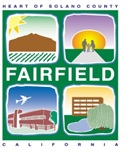| | | | | | | | 
AGENDA REPORT
|
| | | | | | | | DATE:
| July 21, 2020
| TO:
| Mayor and City Council
| FROM:
| Stefan T. Chatwin, City Manager 
| | SUBJECT: | Public Hearing; and
First Reading and Introduction of Ordinance 2020-14 of the City Council of the City of Fairfield Adopting Amendments to Chapter 25, Article I (also known as the Zoning Ordinance of the City of Fairfield) Addressing Cannabis Activities to be Consistent with Chapter 10E “Commercial Cannabis Businesses” of the Fairfield Municipal Code
|
|
| | | | | | | | | RECOMMENDED ACTION | | Hold public hearing; waive full reading, read by title only; and introduce ordinance for first reading. |
|
| | | | | | | | | STATEMENT OF ISSUE | | The Fairfield Zoning Ordinance currently prohibits all commercial cannabis activity within the City. As such, it conflicts with Chapter 10E of the Fairfield Municipal Code. The proposed ordinance amends the Zoning Ordinance to be consistent with Fairfield Municipal Code Chapter 10E “Commercial Cannabis Businesses”. |
|
| | | | | | | | | DISCUSSION | On June 16,2020, the City Council adopted Ordinance No. 2020-07, establishing a process for allowing a certain number of commercial cannabis businesses to operate in the City, pursuant to a commercial cannabis business permit. The adopted regulations are Chapter 10E of the municipal code. The Zoning Ordinance, which regulates the locations where commercial cannabis activities can occur, currently prohibits outright all such activities. To ensure consistency with Chapter 10E, the Zoning Ordinance needs to be amended.
On July 8, 2020, the Planning Commission considered the revisions to the Zoning Ordinance contained herein and, after holding a duly noticed public hearing, voted to recommend that the City Council approve revisions. However, the Planning Commission did not approve staff’s recommendations and instead recommends Council adopt Zoning Ordinance standards that differ from Chapter 10E. Staff’s recommended Zoning Ordinance amendments are detailed below. Following the details of recommended changes, staff presents a discussion highlighting the modifications Planning Commission recommends.
1. Cannabis Regulations
Staff recommended to Planning Commission amendments to Section 25.32.17 “Cannabis Regulations” to be consistent with Chapter 10E of the Fairfield Municipal code. Specifically, that commercial cannabis activities are permitted within the City subject to the rules and requirements of Fairfield Municipal Code Chapters 10E and 10F.
2. Definitions
Staff recommends amendments to Section 25.50 “Definitions” to include: 1) a definition for commercial cannabis businesses permitted within the City including retail, testing labs, and manufacturing consistent with Chapter 10E, 2) to remove references to medical marijuana dispensaries which are obsolete, and 3) to clarify the definition of crop production as it relates to cannabis cultivation.
• Commercial cannabis businesses are defined as follows:
“Commercial Cannabis Business. Any business or operation which engages in medicinal or adult-use commercial cannabis activity.”
“Commercial Cannabis Business, Retail. An establishment engaged in the retail sales of cannabis products and is owned and operated pursuant to a valid commercial cannabis business permit for retail from the City and a valid State license. Includes both storefront and non-storefront retailers as defined in FMC Chapter 10E Section 10E.5.”
“Commercial Cannabis Business, Testing Lab. An establishment engaged in the testing of commercial cannabis and is owned and operated pursuant to a valid commercial cannabis business permit for testing labs from the City and a valid State license.”
“Commercial Cannabis Business, Manufacturing. An establishment engaged in the production, preparation, propagation, or compounds cannabis or cannabis products, directly or indirectly, by extraction methods, independently by means of chemical synthesis, or by a combination of extraction and chemical synthesis, and is owned and operated by a person issued a valid commercial cannabis business permit for manufacturing from the City and a valid State license as required for manufacturing of cannabis products. May include businesses that use either volatile or non-volatile solvents.”
• The definition of “Office, Administrative, Business, or Professional” is revised to remove the phrase “nor medical marijuana dispensaries, which are prohibited.”
• The definition of “Office, Medical and Dental” is revised to remove the sentence “This classification also does not include medical marijuana dispensaries, which are prohibited.”
• The definition of “Crop Production” is revised to read as follows:
“Crop Production. Agricultural uses including the production of grains, field crops, vegetables, melons, fruits, tree nuts, flower fields, seed production, ornamental crops, tree and sod farms, associated crop preparation services and harvesting activities including mechanical soil preparation, irrigation system construction, spraying not involving the use of aircraft, crop processing and sales in the field not involving a permanent structure. This classification does not include cannabis cultivation which is regulated under Section 25.32.17 “Cannabis Regulations” and Chapter 10E of the Fairfield Municipal Code.”
3. Land Use Tables
To be consistent with Chapter 10E, Staff recommends updates to Table 25-9: Commercial District Land Use Regulations, Table 25-H1: Heart of Fairfield Land Use Regulations, and Table 25-11: Industrial District Land Use Regulations to permit certain commercial cannabis businesses.
• “Commercial Cannabis Business, Retail” is to be permitted in the CS, CT, CR, CM, HWT, IBP and IL zoning districts.
• “Commercial Cannabis Business, Testing Lab” and “Commercial Cannabis Business, Manufacturing” is to be permitted in the IBP, IL and IG zoning districts.
• Each table will include a reference to Chapter 10E (Commercial Cannabis Business) of the Fairfield Municipal Code under the column “Additional Regulations.”
• Two notes will be added to each table which specify additional locational requirements for commercial cannabis businesses under Chapter 10E. The notes shall read as follows:
“Retail sales of cannabis shall not be located on any commercial or industrial property within the area bounded by Travis Blvd., Pennsylvania Ave., and Gateway Blvd.”; and
“No commercial cannabis business, whether Retail, Manufacturing, or Testing Lab, shall be closer than six hundred (600) feet from any of the following sensitive uses that are in existence at the time a permit application is deemed complete: a public or private school providing instruction in kindergarten or any grades 1 through 12; a child day care center; or a youth center, as defined in Chapter 10E of the Fairfield Municipal Code. The distance measured shall be the horizontal distance measured in a straight line from the property line of the parcel with the sensitive use to the closest property line of the lot on which the cannabis business is located.”
Planning Commission Recommended Changes
Planning Commission’s change to Staff recommendations applies to the Land Use Tables notes discussed above. Specifically, Planning Commission voted unanimously on a 5-0-2 vote (with two Commissioners absent), to:
• Increase the property line distance from six hundred (600) feet to one thousand (1,000) feet;
• Add churches or other religious institutions as sensitive uses; and
• Add all public parks as sensitive uses, not just youth serving.
Staff highlight two challenges with the modified language recommended by Planning Commission:
1. The City has limited regulatory oversight over the location of churches or religious institutions from a land use perspective. In effect, any location can be a religious institution so long as they meet minimal assembly use requirements. Except for in specific zones, this means that effectively any location can be a church or religious institution.
This makes use conformance nearly impossible for the City when determining if a Cannabis Business location complies with the Zoning Ordinance. Additionally, it provides an avenue for Cannabis Business opponents to prevent the legal operation of a Cannabis Business in compliance with Chapter 10E. An opposing individual or group could simply state that a location within one thousand (1,000) feet of a proposed site is, or has operated as, a religious institution, and the City would have a difficult time challenging that it has not operated as such.
2. The one thousand (1,000) feet distance further limits opportunity sites for Cannabis Businesses. A prospective Cannabis Business operator raised a similar concern during City Council’s consideration of the ordinance establishing Chapter 10E.
For these reasons, Staff disagrees with the Planning Commission recommendation.
Attached to this Staff Report are both the Planning Commission recommended Ordinance language (Attachment 1 - redlined) and the Staff recommended Ordinance language (Attachment 2). If Council chooses to follow Planning Commission recommendations, staff must return to Council with an Ordinance amending Chapter 10E. Currently, Chapter 10E specifies the six hundred (600) feet minimum requirement and does not define sensitive use to include churches or religious institutions.
|
|
| | | | | | | | | FINANCIAL IMPACT | | There are no direct financial impacts to the City. |
|
| | | | | | | | | CITY COUNCIL WORKPLAN | Community Safety
| Community Infrastructure | Quality of Life | | Financial and Operational Sustainability | Economic Development | Travis Air Force Base |
| City Council Goal this item supports:
Economic Development |
|
| | | | | | | | | PUBLIC CONTACT/ADVISORY BODY RECOMMENDATION | At its July 8, 2020 meeting, the Planning Commission held a public hearing that was duly noted in the Daily Republic on June 28, 2020. Following the closure of the public hearing and deliberations, the Planning Commission unanimously adopted Resolution No. 2020-12 recommending the City Council adopt the proposed ordinance amendments, but with two types of modifications to the amendments recommended by staff. First, the Planning Commission recommended that the Zoning Ordinance require a 1,000-foot separation between retail cannabis sales uses and identified “sensitive uses” instead of 600 feet. Second, they recommended that the list of sensitive uses for retail cannabis sales uses should include churches and other places of worship and include all parks instead of just those that serve youth.
A Public Hearing Notice was published in the Daily Republic, emailed to all persons on the noticing list, and posted on site for the City Council meeting on July 21, 2020. The City has received no comments regarding the proposed amendments to the zoning ordinance at the time of this writing.
|
|
| | | | | | | | | ALTERNATIVE ACTION | The City Council may choose to:
1. Adopt the Planning Commission recommended Zoning Ordinance Amendment; or
2. Adopt staff’s recommended Zoning Ordinance Amendment; or
3. Provide further direction as to desired Zoning Ordinance Amendment language; or
4. Deny the item and not adopt the proposed ordinance. However, no commercial cannabis business permits can be issued until the Zoning Ordinance is brought into consistency with Chapter 10E of the Fairfield Municipal Code.
|
|
| | | | | | | | | COORDINATED WITH | City Attorney's Office, Police Department
|
|
| REVIEWERS: | | Reviewer | Action | Date | | Feinstein, David | Approved | 7/9/2020 - 7:26 PM | | Answerer | Approved | 7/10/2020 - 1:16 PM | | Gassaway, David | Rejected | 7/10/2020 - 3:23 PM | | Gassaway, David | Rejected | 7/13/2020 - 8:00 PM | | Gassaway, David | Approved | 7/14/2020 - 1:43 PM | | Alexander, Amber | Approved | 7/14/2020 - 1:53 PM | | Alexander, Amber | Approved | 7/14/2020 - 1:53 PM |
|
|